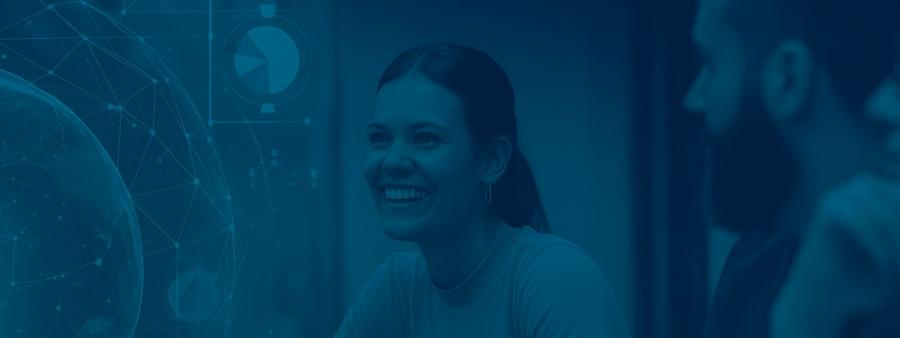Healthcare innovation is not the future, but the present

The goal is clear: to make healthcare a more humane, accessible, and proactive sector. And to achieve this, it takes more than just technology: it takes professionals who are prepared to design and implement it meaningfully.
In Spain, companies such as Telefónica are already leading new initiatives with solutions based on artificial intelligence (AI), wearable devices, and virtual reality (VR) that are revolutionizing the way disease is diagnosed, treated, and prevented.
Digital healthcare is no longer the future: it is the present
Telefónica Tech is deploying a digital health ecosystem that integrates technologies such as IoT, Big Data, cloud, AI, and cybersecurity in hospitals and homes. As El Confidencial points out in a recent news article, key initiatives include:
IoT for predictive care
Sensors and bracelets with beacons have been installed in hospitals such as Vall d'Hebron, capable of monitoring the patient's location in the operating room and notifying family members of their status in real time.
In homes, the devices detect abnormal patterns and environmental risks, sending automatic alerts to caregivers or emergency services.
Big Data for personalized medicine
Telefónica uses large volumes of clinical data—medical, genetic, and environmental—to offer precision medicine for chronic diseases such as cancer. Thanks to advanced algorithms, diagnoses are optimized, testing times are reduced, and complications are anticipated.
Cloud and 5G connectivity
Its healthcare platform enables data interoperability and 5G connectivity, which are key to services such as telesurgery, teleassistance, and real-time monitoring of IoT devices.
Cybersecurity as a central focus
Given the sensitivity of medical data, Telefónica is committed to robust protection, encryption, and access control protocols when handling patient information.
Technology with purpose: this is how digital health is experienced at La Salle
At La Salle Campus Barcelona, the Master's Degree in E-Health has been preparing professionals who want to transform healthcare by combining technology, management, and health for years.
This month, the Paranimf Hall was the setting for the final defenses of the master's degree, where students presented innovative projects with a clear commitment: to improve real lives through technology, empathy, and knowledge.
Each project was a demonstration of the commitment to transforming the healthcare system through technology, empathy, and knowledge.
Virty: Virtual reality for children's eye health
Virty offers a pioneering system for detecting vision problems in children using virtual reality glasses, interactive tests, and an AI model for pre-diagnosis.
Designed for implementation in schools and opticians, it aims to reduce underdiagnosis and promote equity from an early age. “We want to prevent visual problems from limiting learning or self-esteem.” Financial analysis demonstrates its viability as a scalable and sustainable solution.
Althea Health: Remote healthcare for rural areas
Designed to improve healthcare access in environments such as Pallars Sobirà, Althea Health connects IoT, a medical app, and a telemedicine center to offer a more effective and preventive remote care model.
The project is integrated with the Shared Medical Record and includes pilot, training, and scaling phases. “Technology with real impact, where it is most needed.”
Gala-T-Eye: Early screening for ADHD in early childhood
This project is the first to combine smart T-shirts and eye-tracking technology to detect indicators of ADHD in children aged 3 to 5 years, in a natural way and without altering their environment.
The data is analyzed using AI, generating clinically useful reports that complement professional assessment. A tool with great potential for prevention and early diagnosis.
Activity Dose: Prescribing exercise from the doctor's office
With a direct approach to combating sedentary lifestyles, Activity Dose allows primary care professionals to prescribe personalized physical exercise, integrated into their clinical routine.
It responds to a real need: 70% of professionals do not prescribe activity due to lack of time or resources. This tool seeks to improve patient adherence and reduce cardiovascular risks. “Movement is also medicine.”
FACe-C: AI to detect cancer from primary care
FACe-C is a digital solution based on artificial intelligence that helps family doctors identify early signs of cancer in patients with nonspecific symptoms.
It integrates with the ECAP system, analyzes clinical data, and proposes follow-up decisions without replacing professional judgment. Its ethical, preventive, and scalable approach positions it as a strategic ally in strengthening primary care.
Purposeful education, a master's degree with impact
The Master's Degree in E-Health at La Salle-URL (both online and in-person) trains professionals to lead the digital transformation of the healthcare sector.
From emerging technologies such as AI, IoT, virtual reality, and Big Data to innovative project management, the master's degree offers a unique academic experience, led by leading figures such as Toni Masi and Oriol Estrada, as well as a teaching staff linked to leading institutions such as Vall d'Hebron, Sant Joan de Déu, Clínic Barcelona, CatSalut, and Sanofi.
Among its professors is Eva Aurin, director of E-Health at Telefónica, who brings a practical and up-to-date vision of the sector.
Do you want to be part of the change?
Discover the Master's Degree in E-Health and transform the healthcare system with real impact.

eHEALTH AT | LA SALLE-URL